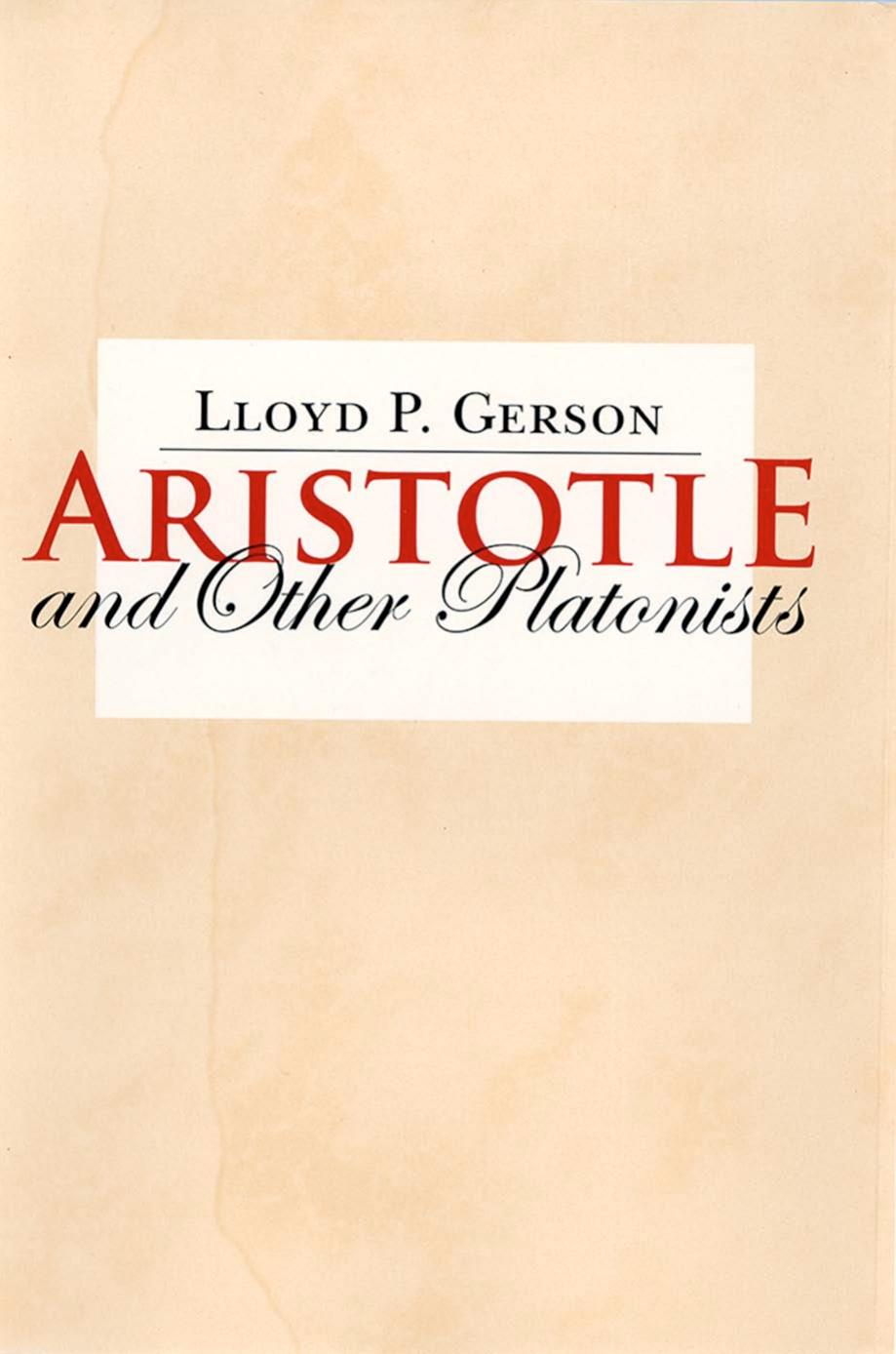Aristotle and Other Platonists by Lloyd P. Gerson

Author:Lloyd P. Gerson [Gerson, Lloyd P.]
Language: eng
Format: epub, pdf
Publisher: Cornell University Press
Published: 2017-08-28T04:00:00+00:00
* * *
1. See Nuyens 1948, 48.
2. Ibid., 57.
3. Ibid., 58. Jaeger 1948, 332â334, claims that âthe third book of On the Soul [De Anima], which contains the doctrine of Nous, stands out as peculiarly Platonic and not very scientific. This doctrine is an old and permanent element of Aristotleâs philosophy, one of the main roots of his metaphysics.â But Jaeger thinks that this âelementâ does not cohere with the empirical psychology, which âbelongs to another stage of developmentâin fact, to another dimension of thought.â Nuyens 1948, 219â220, argues against Jaeger that Book Îâs account of νoÏ ÌÏ can be integrated with the rest of the work so long as the agent intellect is eliminated from the functioning of intellect in the soul (296â310).
4. See esp. Block 1961; Hardie 1964; Lefèvre 1972; Charlton 1987; Wedin 1988; Frede 1992; Cohen 1992; Dancy 1996. Shields (1988, 106) attributes to Aristotle a doctrine he dubs âsupervenient dualism.â As Robinson 1991, 210â212, shows, however, âsupervenienceâ cannot plausibly be supposed to characterize Aristotleâs account of intellect. In addition, hylomorphism understood as supervenience solves no problem posed by dualism.
5. See Blumenthal 1990 for a survey of the background to the Neoplatonic commentaries on De Anima. Blumenthal is highly critical of the interpretive value of these commentaries. See also Blumenthal 1981.
6. De An. B 1, 412b5â6.
7. Hippolytus (d. ca. 235 C.E.) Refutation of all Heresies I 20: âIn practically all matters Aristotle is in harmony (ÏÏ Î¼ÏÏνÏÏ) with Plato, except for his teaching regarding the soul. For Plato says that the soul is immortal, whereas Aristotle says that [ . . . ] remains and after this to be dissipated into the fifth element.â Despite the evident lacuna in the text indicated by the brackets, it is clear that Hippolytus understands the basis for the anomalous disagreement between Aristotle and Plato to be in the matter of immortality. But Hippolytus, who is in this work generally concerned to identify various Christian heresies with different pagan philosophical schools, is not especially interested in anything like a clear or nuanced appreciation of the ancient texts. Later in the work (VII 19, 5â6) he says ruefully that it is not possible to say what Aristotleâs doctrine of the soul is in De Anima. He adds that the definition of the soul given by Aristotle requires âgreat study.â For a valuable account of Hippolytusâs treatment of Aristotle see Osborne 1987, 35â67. Eusebius in his Preparation for the Gospel XV 9, 14, 1â5, quotes the Platonist Atticus (2nd century C.E.) as saying something similar. Atticus, however, adds that whereas Aristotle holds that intellect can exist apart from soul, Plato holds that it cannot: ῾O μὲν Î³Î¬Ï ÏήÏι νoÏ Ìν á¼ Î½ÎµÏ ÏÏ ÏηÌÏ á¼Î´ÏναÏον εἰÌναι ÏÏ Î½Î¯ÏÏαÏθαι, ὠδὲ ÏÏÏίζεει ÏηÌÏ ÏÏ ÏηÌÏ Ïὸν voÏ Ìν. καὶ Ïὸ ÏηÌÏ á¼Î¸Î±Î½Î±ÏίαÏ. ὠμὲν μεÏá½° ÏηÌÏ ÏÏ ÏηÌÏ Î±á½Ïá¿³Ì Î´Î¯Î´ÏÏιν, á½¡Ï á¼ Î»Î»ÏÏ Î¿á½Îº á¼Î½Î´ÎµÏÏμενον, ὠδέ ÏήÏιν αá½Ïá¿³Ì Î¼Ïνῳ ÏÏÏιζομένῳ ÏηÌÏ ÏÏ ÏηÌÏ ÏoÏ ÌÏo ÏεÏιγίνεÏθαι. (âFor the one [Plato] says that it is impossible for intellect to exist without soul, while the other [Aristotle]
Download
Aristotle and Other Platonists by Lloyd P. Gerson.pdf
This site does not store any files on its server. We only index and link to content provided by other sites. Please contact the content providers to delete copyright contents if any and email us, we'll remove relevant links or contents immediately.
The remains of the day by Kazuo Ishiguro(8399)
Tools of Titans by Timothy Ferriss(7818)
Giovanni's Room by James Baldwin(6814)
The Black Swan by Nassim Nicholas Taleb(6772)
Inner Engineering: A Yogi's Guide to Joy by Sadhguru(6444)
The Way of Zen by Alan W. Watts(6290)
Asking the Right Questions: A Guide to Critical Thinking by M. Neil Browne & Stuart M. Keeley(5358)
The Power of Now: A Guide to Spiritual Enlightenment by Eckhart Tolle(5338)
The Six Wives Of Henry VIII (WOMEN IN HISTORY) by Fraser Antonia(5240)
Astrophysics for People in a Hurry by Neil DeGrasse Tyson(5003)
12 Rules for Life by Jordan B. Peterson(4165)
Housekeeping by Marilynne Robinson(4069)
The Ethical Slut by Janet W. Hardy(4041)
Skin in the Game by Nassim Nicholas Taleb(3973)
Double Down (Diary of a Wimpy Kid Book 11) by Jeff Kinney(3932)
Ikigai by Héctor García & Francesc Miralles(3899)
The Art of Happiness by The Dalai Lama(3850)
Skin in the Game: Hidden Asymmetries in Daily Life by Nassim Nicholas Taleb(3729)
Walking by Henry David Thoreau(3685)
